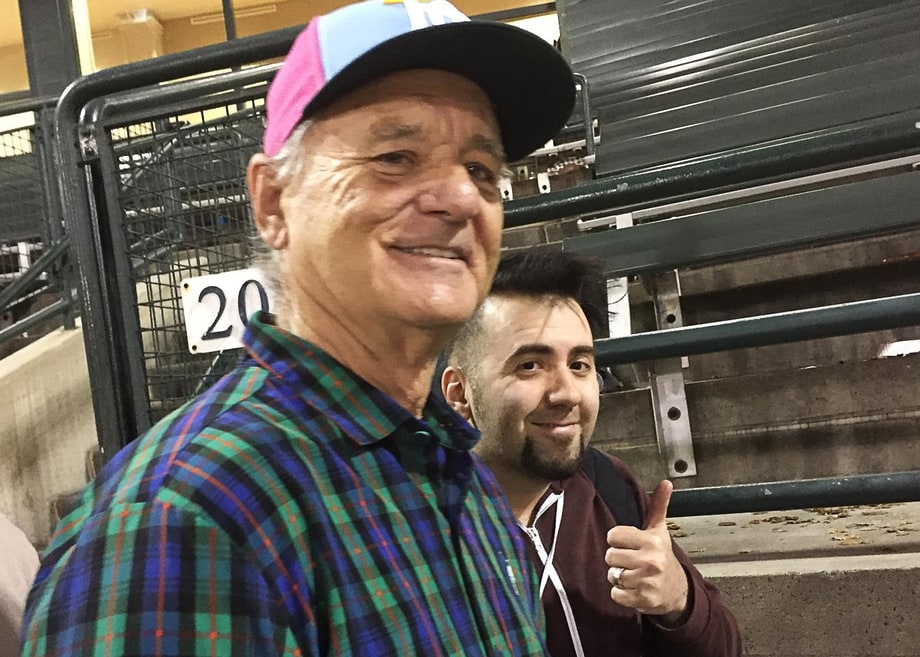Thich Nhat Hanh, a 91-year-old Vietnamese monk and Noble Peace Prize nominee once said that if, while washing dishes, we aren’t mindful of the fact that we are washing dishes then “we are completely incapable of realizing the miracle of life while standing at the sink.”
Hanh advocates for complete mindfulness of the present moment, to find joy even in the mundane. And if tales told by The Bill Murray Stories: Life Lessons Learned from A Mythical Man are to be believed, Murray is a big fan of these Buddhist philosophies, too.

The 70-minute documentary from director Tommy Avallone—who also plays a prominent role onscreen—had two showings this week during the 2018 Newport Beach Film Festival.
At its start, the film explains an urban legend that’s developed around the comedic superstar, perpetuated by sightings across the world that seem too strange to be true: Murray shows up at a dinner party in Charleston and DJs for the group; Murray joins a kickball game in NYC; Murray bartends at a dive bar in Austin; Murray arrives at a SXSW after-party carrying guitar amps then plays tambourine with the band; Murray sings karaoke for strangers; reads poetry to construction workers; drives a taxi cab so the cabbie can play saxophone in the passenger seat; attends a frat party in Scotland and stands in the kitchen washing dishes …
Against a soundtrack of quirky, percussive music, Avallone travels from South Carolina to London to Chicago, speaking with the recipients of the fantastical stories and letting them explain to his ever-present camera crew exactly what went down.
But as the curious details come to cinematic light, it’s hard to know whether they’re just random instances of an A-list celebrity living his carefree life, or else meaningful points in time that when connected, draw a line of deeper purpose across the entire thing.
There’s a problematic trap some documentarians wheedle themselves into, which involves cramming a really great narrative into the confines of what is later discovered as truth. The film postulates these stories are part of some grander scheme by the former SNL comic to enlighten a world distracted by the noise of digital detachment, unable to stand inside a moment and just be.
In the case of The Bill Murray Stories, the facts do corroborate the hypothesis that Murray is on some quest to, if not become a modern-day disciple of mindfulness, at the very least heighten a moment and maybe change a life or two.
Speaking from years of Murray study, prominent entertainment journalists also deliver their theories about the real-life cameos, even arguing that the improvised lines in some of Murray’s most popular movies prove there’s profundity behind the laughs. (Examples include Murray’s unscripted Dalai Lama monologue in Caddyshack, and a line delivered in both Groundhog Day and more famously, Meatballs — “It just doesn’t matter”—that finds roots in an ancient Buddhist proverb wherein the protagonist repeats the very same phrase.)
Maybe it’s true that Murray is some kind of metaphysical advocate for a more meaningful human existence. As depicted by the film, all those who’ve come in contact with him appear to be forever changed.
“By his actions, he’s showing us how we should live,” one Murray-ist explains. “He’s like a candle that lights everyone else and shows you what everyone else can be,” says another.
Murray could also be simply living by the directives of improvisation, which mandate whenever your partner devises a crazy scenario, you cannot negate it but must respond, “Yes, and?”
If your onstage compatriot says you’re a tree then according to improvisational law, you’re a tree. In improvisation, the spontaneity of circumstance dictates the future as the improviser creates joy in the present.
By all accounts Murray brings these tenets of improvisational fun to his personal and professional life. When Lost in Translation director Sofia Coppola called his famed 800 number (he has no cell phone or PR representatives, just a toll-free line to get in touch), she left messages about the upcoming project then flew to Japan, hoping Murray would show. (By the way, he did.)
When the credits rolled on the documentary in Newport Beach, nobody inside the theater moved. They hoped, maybe, that Murray himself would emerge from the back row and answer questions for the rapt crowd. Except as The Bill Murray Stories proves, an appearance at the showing of a documentary crafted in his likeness wouldn’t fit his vibe. Life, as Murray lives it, is about embracing the unexpected and knowing that whatever happens next just doesn’t matter if you can find happiness in the now.


